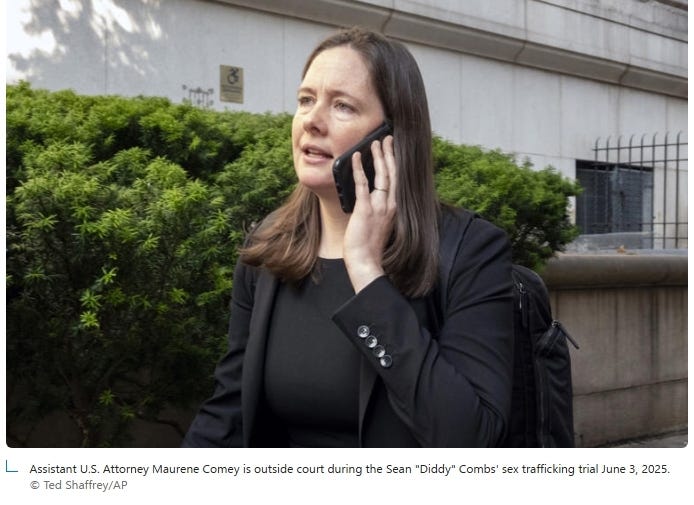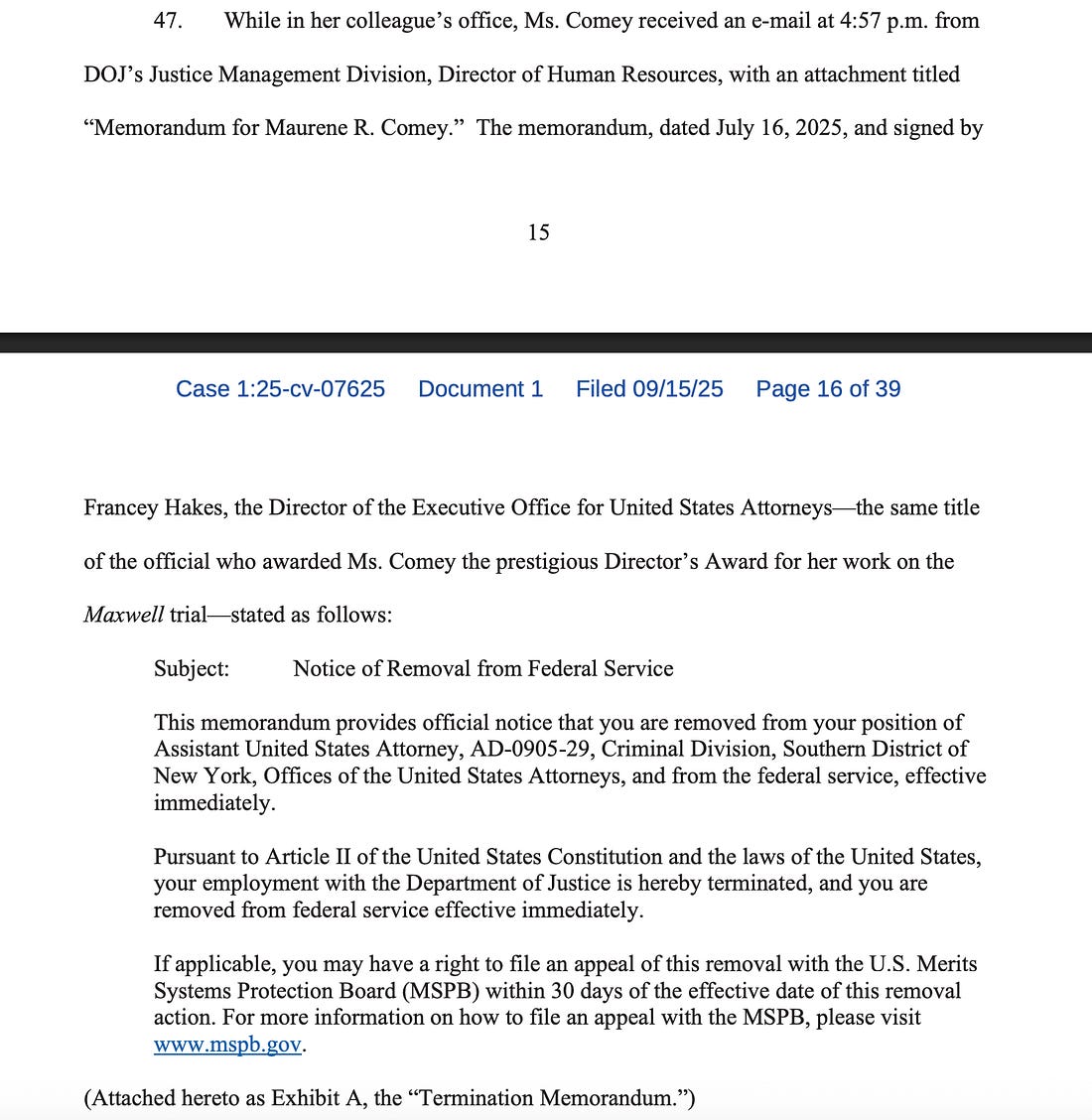|
 |
Former Assistant U.S. Attorney Maureen Comey, in a wrongful termination lawsuit filed today against the government, starts out by saying she spent almost a decade in her job, pursuing her responsibilities “without fear or favor.” Based on the allegations in her complaint, the same cannot be said of the entities she has sued, including the Justice Department, the Executive Office of the President, the Office of Personnel Management, and individuals like Attorney General Pam Bondi.
There is a lot of factual and legal detail in the case, but it’s important because it will have an impact on Trump’s ability to fire at will in the federal bureaucracy, ignoring existing civil service protections for government employees, not just at DOJ, but likely closer to government wide. The 38-page complaint alleges the following violations of law when Comey was fired:
Violation of the United States Constitution (Article II and Separation of Powers) (Against All Defendants): Article II gives the president the ability to appoint and fire “principal officers” (like U.S. Attorneys), but as an Assistant U.S. Attorney, Comey is an “inferior officer”, subject to governance by Congress, which created civil service provisions that prevent firing without due process or without cause and rendering the way Comey was fired a violation of the law.
Violation of the Administrative Procedure Act 5 U.S.C. §§ 706(1) and 706(2) (Against All Defendants): Comey’s firing violated the Administrative Procedure Act by withholding the due process she was entitled to and firing her in an arbitrary, capricious fashion that is contrary to the Constitution and goes beyond what the law permits.
Violation of the Administrative Procedure Act (Ultra Vires in Violation of Statutory Authority) (Against All Defendants): Ultra vires means acting beyond one's legal power or authority. Comey claims that because her firing violated the law, it is ultra vires, so it has no legal force or effect, and it’s as if she was never fired.
Violation of the First Amendment (Freedom of Speech and Association) (Against All Defendants): None of the powers granted to a president in Article II trump every person’s right to freedom of speech and association, granted in the First Amendment. So, it was illegal to fire Comey because of her father, in retaliation for any of his speech, or due to what they assumed about her political affiliation and beliefs.
Violation of the Fifth Amendment (Procedural Due Process) (Against All Defendants): The Due Process Clause of the Fifth Amendment guarantees that “no person shall … be deprived of life, liberty, or property, without due process of law.” Comey had property and liberty interests in her continued employment with DOJ. The administration can’t circumvent her Fifth Amendment rights by claiming Article II trumps them.
Violation of the Fifth Amendment (Property Interest) (Against All Defendants): Another due process claim, focusing on Comey’s property interest in her continued employment with DOJ under the Fifth Amendment of the United States Constitution.
Violation of the Fifth Amendment (Liberty Interest) (Against All Defendants): The Fifth Amendment’s protection against deprivation of liberty without due process of law protects against reputational harm caused by government actors when that harm is accompanied by other harm. Here, the Defendants’ actions harmed Comey’s reputation by terminating her without cause and implicitly confirming “stigmatizing allegations” made by Loomer and others. There is additional harm, because Comey’s loss of her job under these circumstances damages her future employment prospects.
Violation of the Fifth Amendment (Reputational Harm) (Against All Defendants): This is a substantive due process claim, with Comey arguing that the Defendants’ actions violate those rights by damaging the reputation she had worked for years to establish. The Fifth Amendment protects “reputation plus” harms like the ones here where Comey’s reputation was damaged and she lost her job.
Declaratory Judgment – 28 U.S.C. §§ 2201 and 2202 (Against All Defendants): Declaratory relief is a court order that formally declares the rights and obligations of parties in a dispute, so that any uncertainty is resolved before the situation can go further. Comey wants the court to enter a declaratory judgment, clarifying that her firing was unlawful and ordering her reinstated.
Relief in the Nature of Mandamus (Against All Defendants): Mandamus is an order that is rarely used; in this context, it would take the form of an order from the court to the government to do something, to reinstate Comey in her position, and compensate her for the loss of it. She asks for this relief in the alternative to a declaratory judgment, knowing that it’s less likely, but she has a powerful argument for it in this case, because of the ultra vires nature of her termination from government service.
We’ll get to those claims in a minute. This, of course, is a civil case, not a criminal one. That means it’s two parties suing each other over damages—no one goes to prison at the end of a civil case. And we have a “complaint” instead of an indictment, alleging different violations of constitutional and civil law that Comey, the plaintiff, says mean she’s entitled to both monetary and other compensation from the government.
Because that’s a lot, and because this is a very important case, we’ll spend time tonight going through the allegations in the complaint in more detail. What’s at stake is the ability of the president to fire prosecutors, even exemplary ones, because he doesn’t like them, or their father, or the cases they’ve been working on, or simply thinks they lack personal loyalty to him, or just wants to get rid of them. That’s no way to run the Justice Department, where prosecutors have civil service protections that make it difficult to fire them absent solid cause. But the administration did an end run around those longstanding rules in Maurene Comey’s case, despite the fact that she’d been asked to be the lead prosecutor on “a major public corruption case” just the day before she was fired.
Comey is asking the court to rule that the government violated multiple provisions of federal law when she was fired. She asks to be reinstated immediately, with the government enjoined from taking any additional adverse personnel action against her, absent the appropriate procedural and substantive due process. She also asks for back pay for the time she has been out of work and asks that the government be forced to pay the costs of the lawsuit she has filed, including her attorney fees.
The complaint tells a story, as all good civil complaints do. Comey points out that she obtained “hundreds of criminal convictions” in serious cases including homicides, racketeering, and public corruption. She prosecuted Sean “Diddy” Combs, Robert Hadden, Jeffrey Epstein, and Ghislaine Maxwell. She was promoted and she received awards for her work, including an “outstanding” evaluation—the highest a prosecutor at DOJ can receive—just months before she was summarily fired. She wasn’t fired by her boss, the U.S. Attorney for the Southern District of New York, Jay Clayton. Instead, she received an email saying she was being terminated “[p]ursuant to Article II of the United States Constitution and the laws of the United States.” In other words, by virtue of presidential power. As Trump put it during a Turning Point USA speech to young people during his first term in office in 2019, “I have an Article II, where I have the right to do whatever I want as president.”
Comey’s lawyers in this case say, not so fast. The lawsuit claims that Comey’s termination—without cause, without advance notice, and without any opportunity to contest it—was unlawful and unconstitutional. They point out that there hasn’t been even an effort to point to a legitimate reason for her firing. That, they write, is because there isn’t one: “Defendants fired Ms. Comey solely or substantially because her father is former FBI Director James B. Comey, or because of her perceived political affiliation and beliefs, or both.” In a footnote, they point out that Comey, who refused to swear a loyalty oath to Trump, has been the subject of repeated vitriol by the president on social media, noting “President Trump has posted (or reposted) approximately 259 times about Mr. Comey from October 16, 2016, to the date of this filing, including repeatedly calling him the ‘worst’ FBI Director in history.”
Jim Comey’s firing from his job as FBI Director and the subsequent release of information regarding conversations he had with Trump during his tenure led to the opening of the Mueller Investigation into Trump’s ties to Russia in 2017, if you can remember that far back. Trump clearly can.
The complaint suggests that it was an incident with Jim Comey that triggered his daughter’s firing. In May, he posted a photo of seashells arranged to form the numbers "86 47," on his Instagram account. Outrage erupted over this “threat” against the president, and Comey promptly removed the photo, saying he had not meant it to be anything of the sort. Trump called Comey a “dirty cop” and said the post was an “assassination message.” But it triggered Laura Loomer to call for Maurene Comey’s firing, which happened in short order. Loomer, who has 1.7 million followers on social media, boasted after the firing that she had waged a months-long “pressure campaign” on AG Pam Bondi to make it happen.

